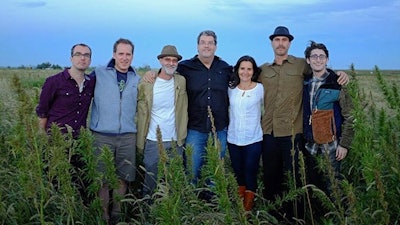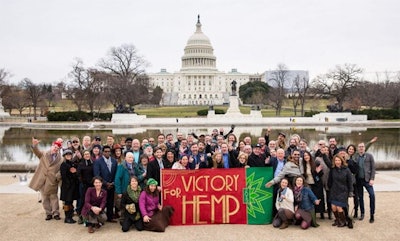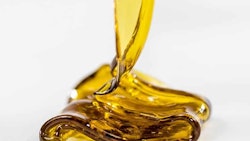
Federal policy on hemp has come a long way, since the passage of the Agriculture Improvement Act of 2018 (2018 Farm Bill) and the authorization of states and tribes to legally grow, manufacture and sell the crop. But before many people even knew what cannabidiol (CBD) or other hemp-derived cannabinoids were, Vote Hemp was advocating for industrial hemp legalization and an end to Drug Enforcement Administration (DEA) raids. As it continues to push for the acceptance and use of this plant, the nonprofit organization is celebrating its 20th anniversary in 2020.
Founding and Early Years
In 1992, Eric Steenstra and Steve DeAngelo started a hemp clothing company called Ecolution. “We grew it from scratch,” Steenstra, now the president of Vote Hemp, tells Hemp Grower. “We developed a line of 100% hemp clothing coming out of Eastern Europe. ... We started working with others in the industry and talking about common challenges that we were all facing, importing products, trying to source things overseas and having to import them. We knew that there was a history, that hemp had been grown here and it didn't make a lot of sense that we couldn't source it here and the farmers in the United States were being left out.”
Ecolution grew to more than $3 million in sales during its roughly seven years in existence, Steenstra says. However, the company had to price its products, such as hemp jeans, high. Continued growth would be dependent upon positioning the company as a fashion brand—and that would involve an extensive marketing budget and marketing experience that the team didn’t have. So, Steenstra and DeAngelo sold the company in 1999.
A group that included Steenstra and Lloyd Hart, whom Steenstra describes as a “political operative,” decided to work to change hemp law and founded Vote Hemp in 2000. “We just began working largely at the state level in the very beginning,” Steenstra says. “Then, after a couple of years, we started doing some outreach on Capitol Hill.”
David Bronner says he joined Vote Hemp’s board in 2001 after adding hemp seed oil to his business’ soap formulation in 1999. Dr. Bronner’s Magic Soaps, the company his grandfather Emanuel Bronner founded in 1948, “exists to make the world better,” he says. “That's how we … engage with it, and the first major activist move would have been to incorporate hemp seed oil.” (Hemp seed oil contains essential omega-3 fatty acids, which are beneficial for skin health; Dr. Bronner’s conducted trials with its products containing the oil, and after receiving positive feedback, began incorporating it into many of its products.)
Working with Vote Hemp, Bronner has worked to advance the production and use of the crop, in part through helping fund legal cases.
Vote Hemp supports farmers and the hemp industry, in addition to advocating for improvements in hemp law and policy. In addition, Bronner describes Vote Hemp as “the hemp-consumer voice at the federal level.”
“Vote Hemp can really mobilize a lot of people to contact their representatives about regulations and is lobbying to improve regulations over the next [several] years,” he says.
Political Progress
In the early 2000s, two of the politicians who were outspoken about hemp legalization were third-party presidential candidates Ralph Nader and Ron Paul.
Vote Hemp helped draft the first Industrial Hemp Farming Act in 2005, introduced by then-Rep. Paul (R-TX). If passed, it would have removed hemp from the Controlled Substances Act and gave authority to the states to regulate the crop.
“Ron Paul, being a libertarian, took a states’ rights approach and a very limited-government approach to everything he did,” Steenstra says. “So, the original bill was drafted as a states’ rights bill, essentially, allowing states to regulate it, and that approach stuck through the whole process.”
The Industrial Hemp Farming Act of 2005 didn’t pass, but Steenstra says it ignited a political spark.
“That was the beginning of the process at the federal level, and we just kept building each year,” Steenstra says. “We’d go and meet with offices and kept working with state legislators at the same time. We did a lot of work in the states—early states like Colorado, North Dakota and Kentucky—we made some early attempts as well—there’s a bunch of states that tried to do that. In any case, the states were great because they helped to provide the pressure to push things at the federal level that there was interest in this.”
Vote Hemp worked on hemp bills over the years with Democrats and Republicans who were willing to reach across the aisle, Steenstra says. For instance, he points out that in the California State Assembly, Chuck DeVore, whom he described as a “very conservative” Republican, and Mark Leno, a Democrat, co-authored AB 1147. (The California State Assembly and State Senate passed the bill, but former Gov. Arnold Schwarzenegger vetoed it.)
“We saw that pattern over and over throughout the years that we were able to pair up Republicans and Democrats,” Steenstra says. “Some focused a little bit more on one type of benefit than the other, but they could both see the economic benefits, so that was great to have that bipartisan cooperation. It allowed us to really advance the policy on this.”
Throughout the years, Vote Hemp continued to work with political leaders who introduced and advocated for federal hemp legislation. Among them was U.S. Sen. Ron Wyden (D-OR), who in 2011 worked on a companion bill to the Industrial Hemp Farming Act of 2011, the fourth hemp bill Paul introduced in the U.S. House. (Paul had also introduced hemp bills in the House in 2007 and 2009.)
Then, former U.S. Rep. Jared Polis (D-CO), who is now governor of Colorado, introduced an amendment to the House version of the Agricultural Act of 2014 (2014 Farm Bill) to allow for university research into hemp, Steenstra says. It passed with the bipartisan support of 162 Democrats and 63 Republicans.
“The work that we had done, knocking on doors, meeting with staff, talking with members and educating them on what hemp was, why it had economic potential—that day was a really proud moment for me and for us as an organization because it was the first major step forward, and it woke up a lot of people,” Steenstra says.
And former Kentucky Agriculture Commissioner James Comer, someone else Vote Hemp had been working with, helped convince U.S. Sen. Mitch McConnell (R-KY) that hemp production would be a boon for the state. McConnell—at the time the Senate minority leader and now its majority leader—proceeded to push for language that made it into the 2014 Farm Bill.
“Senator McConnell was able to work through the conference process to get the language tweaked a little bit from the original Polis amendment to include departments of agriculture, at James Comer's request, and to expand it to include the words 'pilot programs,' and to expand the purpose to include marketing,” Steenstra says. “Those three changes were critical to allowing this to become more than just a couple of universities with a plot of hemp behind a barbed-wire fence. That’s essentially what would have ended up happening, had it not been expanded.”
Involvement in Legal Cases
Throughout the years, Vote Hemp has been involved in several court cases to support and advance the hemp industry and consumers.
- Hemp Industries Association v. Drug Enforcement Administration. In October 2001, the Drug Enforcement Administration (DEA) “tried to ban the consumption of any product that had any THC [tetrahydrocannabinol],” Steenstra says. He and Bronner hired lawyers who successfully filed an injunction in California’s 9th Circuit Court of Appeals, and in 2004, they received a unanimous decision from the court in support of HIA's position that hemp foods shouldn’t be banned. “Dr. Bronner’s provided the majority of funding for the case,” according to Vote Hemp’s website.
- United States of America vs. Alexander “Alex” White Plume. In 2000 and 2001, the DEA destroyed Oglala Sioux Native American Alex White Plume’s hemp crops, not recognizing an ordinance the tribe had passed in 1998 allowing for hemp cultivation on the Pine Ridge Indian Reservation in South Dakota. When White Plume planted hemp a third season, the DEA filed an injunction against him to discontinue planting. Again equipped with funds from Dr. Bronner’s, Vote Hemp got involved, and eventually, according to Steenstra, helped get the case overturned in federal court.
Steenstra adds: “Ultimately, when the 2014 Farm Bill happened, Native Americans were left out of that. Because of the way the bill was written, in the drafting of this thing, we didn't realize that Native Americans would be left out of this the way the original language was.That's something we worked hard to correct—I personally worked very hard to correct—in the 2018 Farm Bill. We did get it, so as you can see now, tribes have a direct right to go and apply for the ability to regulate hemp on their reservations through the USDA.”
- Monson v. DEA. In 2007, farmer David Monson, a Republican in the North Dakota House of Representatives, and another farmer, Wayne Hauge, filed a lawsuit against the DEA. The suit filed in North Dakota’s U.S. District Court aimed to end the DEA’s “obstruction of commercial hemp farming in the United States,” according to Vote Hemp’s site.
"The case was ultimately not successful,” Steenstra says. “But it was a really important effort in trying to move policy forward and to educate people on this, and to have a state like North Dakota looking at this and saying, ‘Look, we see a real opportunity here for this crop, and we want to be able to grow it, and the federal government is standing in our way. We're going to put up a fight to do that.’”

Remaining Challenges
Although the 2018 Farm Bill legalized hemp federally and most states are choosing to set up programs, Vote Hemp is still working to advance policy on a few key issues.
One of the organization’s main priorities is to push for the revision of the U.S. definition of “hemp” to include crops with THC levels higher than the 0.3% limit set in the 2018 Farm Bill.
“Most people who look at hemp from more of a scientific standpoint recognize that varieties of hemp go up to 1% and even more, but certainly that 1% is a more reasonable line—that generally, plants under 1% still aren’t intended for getting high or anything like that,” Steenstra says.
Another priority is to integrate hemp more into existing federal programs, such as including hemp foods in school lunches. Among these foods are hemp seed, which contains healthy omega-3 and omega-6 fatty acids.
“A lot of the money that goes to USDA goes to fund commodity purchases for things that go into school lunches, that go to children all over the U.S.,” Steenstra says. “We think that hemp would be a great ingredient for that.”
A third remaining challenge is pushing for the regulation of hemp-derived products, especially cannabidiol (CBD). The 2018 Farm Bill includes cannabinoids in its definition of “hemp,” Steenstra points out, and the FDA accepted comments from the public about hemp extracts in 2019. However, the FDA holds that CBD products are illegal (though they remain largely unregulated).
“[The FDA has] done nothing but create confusion around this,” Steenstra says. “I can't think of too many products that are more widely distributed right now than CBD. You can find it at your grocery store, your drug store, the gas station. I go get my haircut at the barber, and they’ve got CBD on the counter. It's everywhere. So, why is FDA continuing to fail to regulate this?”
In July 2019, Vote Hemp submitted comments to the FDA on the issue of hemp-derived products. The organization’s letter stated, among other things, that CBD should be regulated like other foods or dietary supplements, “be eligible for organic certification under the USDA’s National Organic Program” and have recommendations for serving sizes.
And, as with many state officials, Vote Hemp has some concerns about the USDA’s interim final rule (IFR) that was issued in October 2019 and addresses hemp production in the U.S.
In January, Vote Hemp also sent comments to the USDA, asking the department to remedy numerous issues, such as the possibility of uncertainty in sampling and testing processes and the USDA’s stated method of collecting samples from the top third of a crop (which contains more THC than the lower parts of the plant).
In addition, Vote Hemp’s letter to the USDA addresses the agency’s ban of people participating in a state or tribal hemp program who have been convicted of a controlled-substance felony in the past 10 years.
“USDA has included a requirement for a report of the criminal history of ‘each key participant’ of an applicant,” Vote Hemp’s letter states. “We urge USDA to ensure this provision is limited to only to individual applicants or owners of a business entity when the applicant is a business entity. We recommend that USDA issue a clarification that this provision does not apply to any non-owner employees or vendors.”
Bronner, an active proponent of cannabis—regardless of THC level—and psilocybin therapy and policy reform, opposes many controlled-substance arrests and convictions to begin with. While that’s a battle of its own, policymakers are coming around to hemp.
“I think we're finally moving into a kind of post-prohibition, rational era,” Bronner says. “For a long, long time, we had the DEA out there just constantly misrepresenting hemp and marijuana and conflating them.”
Now, new challenges arise for the hemp industry, Bronner says, like matching supply with demand. At the same time, he says hemp needs to be regulated the same as corn, soy or wheat. “I think Vote Hemp has a real role to play,” he says.
Steenstra echoes that sentiment, saying, "We're really going to continue to focus on legislation at the state and federal level, … then working with federal agencies to turn it into a major crop and a commodity in the United States.”

























